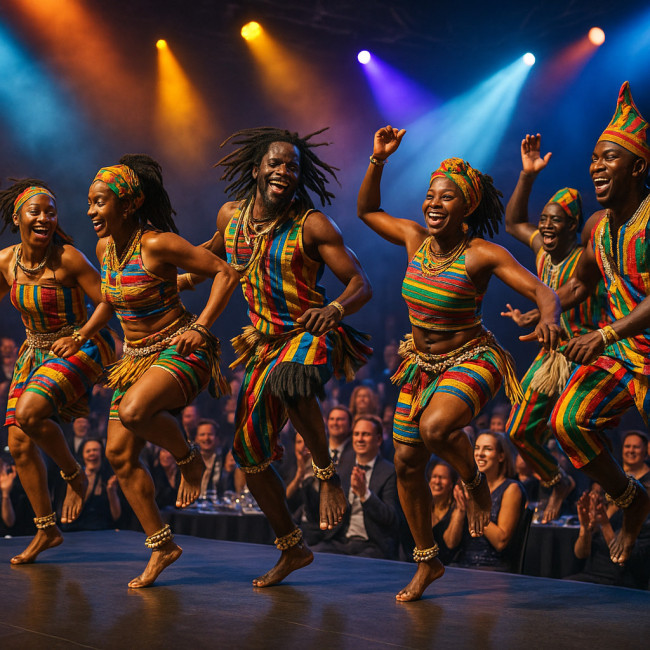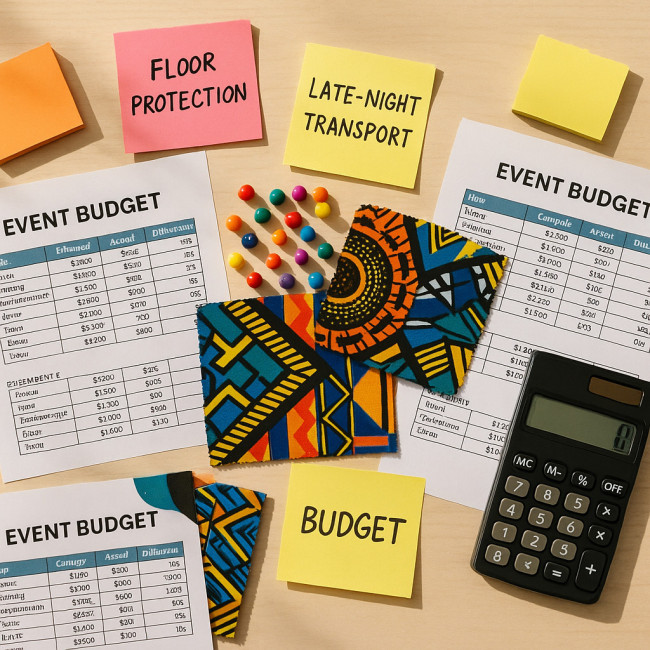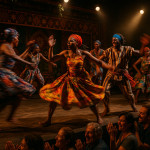Event planners' guide to budgeting local African dancers without hidden costs
Want vibrant African dance at your next event without blowing the budget? This guide walks you through every expense line, reveals hidden fees, and gives you a transparent roadmap to hire local African dancers confidently.
Why transparent budgeting matters

Booking African dance adds cultural depth, storytelling and high-energy entertainment. Yet many planners abandon the idea after a first quote feels unpredictable. Transparent budgeting solves three pain points: avoiding last-minute surcharges, easing approval from finance teams and protecting relationships with talent.
Breakdown of standard cost components
| Cost item | Typical share of total fee | What influences the amount |
|---|---|---|
| Main performance fee | 55 – 65 % | Number of dancers, choreography complexity, rehearsal time |
| Travel & local transfers | 10 – 15 % | Distance, luggage (costumes, drums), fuel surcharges |
| Costume & prop upkeep | 8 – 12 % | Hand-crafted items, cleaning, repairs after shows |
| Sound & tech rider | 5 – 8 % | Extra microphones, on-site percussion mics, floor protection |
| Admin & insurance | 5 – 7 % | Public-liability cover, contract drafting, agency margin if any |
| Contingency reserve | 3 – 5 % | Late schedule shifts, emergency costume fixes |
Key insight
When the performance fee sits under 65 % of the total, you usually have enough headroom to manage extras without surprise over-runs.
Step-by-step budgeting checklist
- Define the act scope early. Is it a 10-minute welcome, a 45-minute show or interactive workshop? Granular scope keeps quotes comparable. Use advanced directory filters to shortlist groups offering the exact format you need.
- Lock travel radius. Local usually means performers within 80 km of the venue. Anything further triggers per-diem and accommodation. The tactics in geo-search hacks help you pick truly local troupes.
- Request an all-inclusive rate card. Ask for a single figure covering rehearsal, performance, costumes, tech and transport. Compare that with the table above. If line items exceed the ranges, discuss why before signing.
- Check tech rider overlap. Your AV supplier might already stock floor mics and foldback wedges. Removing duplicated kit can cut 5 % of the quote.
- Schedule buffer time. African drum-centric shows take longer for sound check. Add 30-minute set-up in the venue timeline to avoid overtime payouts.
- Secure clear contract clauses. A concise agreement like the tips in one-night dance gig contracts prevents scope creep and late fees.
- Plan audience interaction add-ons. A short post-show workshop costs roughly 15 % extra but often doubles audience satisfaction scores.
- Incentivise testimonials. Offer to share professional photos with the troupe. Positive feedback fuels their profile on directories—see client review prompts—and can unlock a small discount for you.
- Cross-reference the regional directory. Verify credentials and past client ratings on the dedicated African dancer directory. Public ratings often highlight hidden costs other planners faced.
Hidden costs to watch—and how to avoid them

For many planners, the challenge with hidden costs is not a reluctance to pay fair rates but the destabilising effect of unexpected line items that surface after the quote has already been signed off by finance. By pre-identifying common extras—custom floor protection, late-night transport surcharges, visa couriers, insurance riders for live drums and emergency costume repairs—and factoring them into your initial worksheet, you convert the process from reactive firefighting to proactive management. Finance directors receive a document that aligns with accounting forecasts, performers feel their professional realities are respected, and you sidestep the awkward “we need an extra €500” message that tends to arrive forty-eight hours before doors open. The net result is a calmer planning cycle, fewer frantic calls, and a reputation for reliability that keeps vendors eager to collaborate on your next programme.
- Late-night load-out fees – Confirm venue closing hours; overtime can be €50-100 per performer.
- Custom floor protection – Wooden stages may need Marley flooring when percussion is involved; budget €5/m².
- Visa paperwork – If dancers cross borders, courier fees for passports add €150-200. Stick to local talent to eliminate this.
- Insurance riders – Some venues demand extra cover for live drums. Ask dancers to share existing policy certificates upfront.
- Emergency costume repairs – Allocate a small €50 kit or have a seamstress on call to dodge express courier replacement costs.
Negotiation tips that keep quality high
Transparent budgeting does not mean squeezing artists. Instead:
- Offer mid-week dates; rates drop by 10 – 20 % when troupes avoid peak weekends.
- Provide professional event photos and a short testimonial—currency that performers value as much as a small fee increase.
- Bundle multiple appearances (e.g., corporate conference day + gala night) for flat-rate savings.
- Share preferred payment terms upfront. Net-15 beats Net-60 and may earn you a goodwill discount.
Case study: Cutting 18 % off a corporate gala quote
A planner in Marseille received an initial quote of €4 400 for six dancers, three percussionists and a 30-minute show. By cross-checking each cost line, they:
- Replaced rented microphones with the venue's in-house kit (-€180).
- Scheduled rehearsals on show day, eliminating a separate studio fee (-€320).
- Added a photo-sharing clause, earning a goodwill discount (-€200).
- Set an 11 p.m. curfew to avoid late-night transport surcharges (-€120).
Total savings: €820 (18 %) without cutting performance quality.
Interactive budget readiness quiz
FAQ
- How far in advance should I book local African dancers?
- For weekend events, book at least eight weeks out. Mid-week slots can often be secured four weeks ahead.
- Are rehearsal fees always separate?
- No. Many troupes include same-day rehearsals in their main fee. Off-site rehearsals incur extra studio charges; ask up front.
- Can I negotiate costume changes within the same fee?
- One costume set is standard. Additional changes add 5 – 10 % per look due to extra prep and packing.
- Is tipping customary?
- Not mandatory, but a €10-15 per performer gratuity is appreciated for exceptional experiences.
Ready to plan a show-stopping performance?
Use the checklist above, compare quotes against the cost table and lock transparent clauses. You'll secure a memorable African dance act, stay on budget and build strong partnerships with local performers.
Action step: Download our free budgeting template and start mapping your line items today.











